All You Zombies
by Elmo Keep
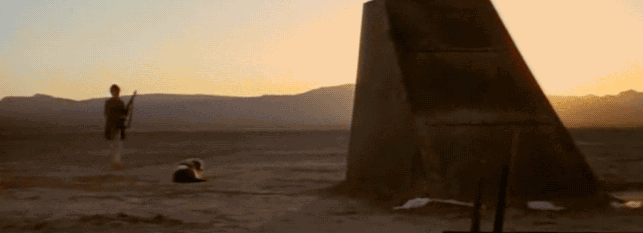
I was in Yosemite when I read about how we are running out of sand. The sand that we use to make buildings is finite just like any other resource, there is only so much of it. Now we are churning through it at an alarming rate, 40 billion tons per year. The sand of deserts is no good for construction, only certain sand will do, mainly granite. The sand that is already concrete can never be destroyed and reconstituted, its chemical reactions are permanent. A time will come in the not too distant future where no more concrete as we currently know it will be able to be used to build the structures in which we live. Illegal trade in construction sand has killed as many people as the cocaine wars in South America.
I stood at the foot of Half Dome as I thought about this. It is made of granite. A five million pound chunk of it fell off its face some time in the last two years but no one seemed to notice until much later. People scale the dome all the time, a plaque helpfully informs that what from a distance might look like ants are actually people. I imagined cranes and drilling apparatus scaling the towering peak to break it down for the last remaining stores of usable construction sand on Earth.
The park was so beautiful that I did not know what to do, so eventually I just lay down in a soft green field adjacent to El Capitan in the afternoon sun and listened to the thundering rush of Horsetail Falls. I stayed there for hours. I thought of a future after civilization; maybe living in the park, sleeping on pine needles under trees while deer roamed quietly nearby and I could eat fish that I caught in the streams. Instead I went back to the lodge built high in the side of a mountain outside the park where in the large wooded dining hall people ate their meals by the fire and traded stories about their travels or played the board games stacked dozens high on the shelves beside the mantle. At night there it was so quiet and so dark there was only the sound of insects to intimate signs of life. The bed that I slept in was unimaginably soft, where by the nightlight I read about the sand.
Months later I would hear about how two people had caught the plague in the park, the first cases since 1959. It came perhaps from squirrels or maybe from chipmunks, but in any case it was recommended that people not get too close to any animals.

A cursory glance at the glut of post-apocalyptic entertainments recently available would suggest the genre is enjoying a moment of appeal unprecedented in its perennially popular history. World War Z, Melancholia, Terminator Genysis, District 9, Elysium, Children of Men, Oblivion, Interstellar, Wall-E, The Hunger Games, The Last Man on Earth, The 100, The Leftovers, Zombieland, This Is The End, The World’s End, Seeking A Friend For The End of the World — these disparate stories all share as their central theme the annihilation of all life as it is known. A fascination with seeing ourselves destroyed is not new, The Book of Revelation going back some way, but it does seem to be that we are now at some kind of Peak Apocalypse. An Apocalypse Apocalypse.
None is more popular than AMC’s zombie series, The Walking Dead. The chief story mechanic of the Walking Dead is unbearably dull: the characters are stuck in a unbroken pattern wherein they try to escape and take shelter from the infected zombie majority of the world’s population by seeking unlikely refuge, attempting to stave off invasion long enough to establish some kind of ad hoc social order, and then, inevitably — usually thanks to a betrayal among their fellow survivors, or sheer idiocy, because geddit, we’re the real monsters? — are pillaged, murdered, turned to zombies, their shelters razed to the ground and then sent off on the exact same path again to recreate the exact same dynamic within a slightly different setting to fend of slightly different Big Bads.
The crushingly boring, literally brainless repetitiveness of this narrative structure coupled with its comically thin character development makes the Walking Dead’s status as the most popular basic cable television series in history all the more perplexing. So popular that a recent prequel series was spun from its cloth, in which the creators promised that viewers would not learn there either, what the source of the outbreak was, thereby robbing the only possibly interesting development in the story from emerging. What exactly is it then about this vision that is so appealing?
For some a contemplation of the apocalypse functions as abject wish fulfillment. Petty frustrations and mundane realities of real life all disappear, as do the complexities: this is often the set-up of many of these stories; say, a divorce proceeding is the most traumatic experience of a hero’s life right up until at that exact moment the world is invaded by aliens or nuked into oblivion or a disease wipes out almost everyone overnight, making this interpersonal pain insignificant in the face of their new task of saving the world. Apocalypse stories enduring appeal as a genre is in the thought experiment undertaken by the viewer or reader: if this actually happened, what kind of person would I be?
After the fall no one will care about your outstanding taxes or your unserviceable student loans or the job that you hate, or your failing relationship, or the family you cannot make peace with — they’re all gone. In this world civilization might have fallen, but so have all your debts. Your very existence might be threatened in your every waking moment, but you are made new. No trees may ever grow again, but who cares, you can prove your mettle against the world with nothing but a golf club at your disposal and see how far you get.
This is the end of the world as escape fantasy.
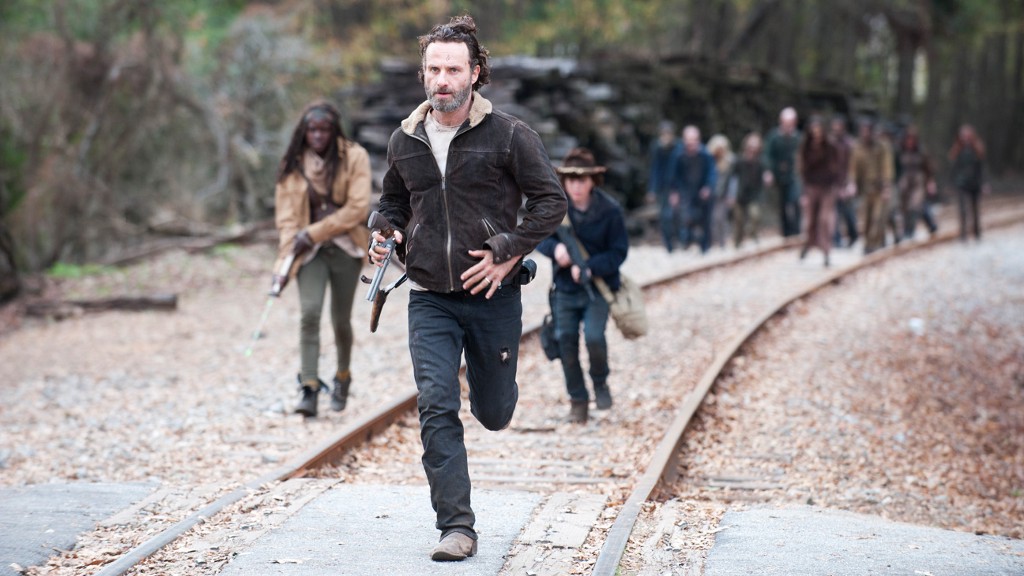
There are no papers, no history, no money, no ties to anything or anyone. Borders have fallen and people move through a new social order of their own making. Ultimately the world of The Walking Dead remains at base an extremely hostile one in which the people closest to the show’s central players cannot ever be completely trusted. Even after the end of capitalism the ideal hero remains the perfect expression of the neoliberal object: every man for himself. Most characters come to grief when daring to be so stupid as to commit an act of selfless bravery for another. In one particularly cruel scene a man staring wistfully for too long at a photograph of two young brothers posing happily is attacked from behind by the same two boys, now turned to zombies and silently roaming their abandoned home. Sentimentality in this world will soon get you killed.
As far as the television series goes, The Walking Dead’s conception of the world post-society is geared only around pure survival, there is no bacchanal. Earlier seasons located sex as infidelity and the excuse to turn two male leads against each other in the fight over one of the men’s wife — the B plot of an entire season. Apart from this it is effectively chaste. The show remains grim beyond all tolerability (a recurring threat concerns the survival of a newborn baby), dispatching lead characters with the same gleeful propensity as Game of Thrones (and with the same inevitable diminishing returns on continually pulling that same trick.) So far in five seasons not even the vaguest intimation of hope has been permitted to pierce the gloom.
Its ultra-nihilist worldview might be sticking to some agreed-on as realistic portrayal of how quickly humanity would turn on itself once the shit hits the fan, but it makes for exhausting and ponderous viewing to anyone who can’t see a good reason for the perpetuation of all this misery across dozens of hours: what is it about this new society, which makes Cormac McCarthy’s The Road look like A Roman Holiday, that in any way makes it worth saving or being a part of? Just let the zombies eat me and be done with it. (The characters do seem to never run out of toilet paper, or clothes they salvage which conveniently fit them exactly, and they all manage to keep rather good haircuts and pristinely clean teeth, so there must be some upsides.)
Previous iterations of post apocalyptic narratives hewed to anxieties over nuclear annihilation (A Canticle for Leibowitz, The Day The Earth Caught Fire, Mad Max), communicable diseases (The Fly, Alien, 28 Days Later), and almost since the invention of the computer, a terror of sentient and murderous cyborgs or machines (Westworld, 2001: A Space Odyssey, The Terminator). The irresistible possibilities these scenarios have presented to speculative fiction writers, with all of society’s rules suspended and the stakes being life or death at every moment, have concocted some of the most inventive and heart stopping drama of any genre (I will submit to you here that beat by beat, Terminator 2 is the most perfectly paced and choreographed action film of all time, shot more like a high budget art film than a sci-fi thriller), but The Walking Dead is not among them.

The most anticipated videogame title announced at the E3 conference in Los Angeles was the long in development Fallout 4, a hugely popular first person role-playing game in which you inhabit the character of the Lone Wanderer, an unwitting survivalist modelled on Mad Max who navigates the irradiated wasteland of a post-nuclear United States in a alternate future where civilization was permanently arrested in the 1950s. The most recent previous installment of the game was released in 2010, Fallout: New Vegas. Here the question of who you would be if the world ended can most convincingly and satisfying be answered through the addicting agency of dictating the story through the choices made by you, the player.
Are you woman or man? Good or evil? A brute or a pacifist? Will you trust only yourself or team up with companions? You equip your character when you begin with different personality traits that will dictate the kind of game you will play. You can make yourself highly intelligent and persuasive in negotiations, quick to pick up new skills and fast on your feet. Or you can concentrate on making yourself an extremely effective killing machine, low on smarts but big on physical strengths and able to take extraordinary amounts of punishment. Your actions in the world can be either good or bad, treating people well or terribly, which will affect your reputation as you progress, making you either friend or foe to the inhabitants of New Vegas and they will interact with you accordingly.
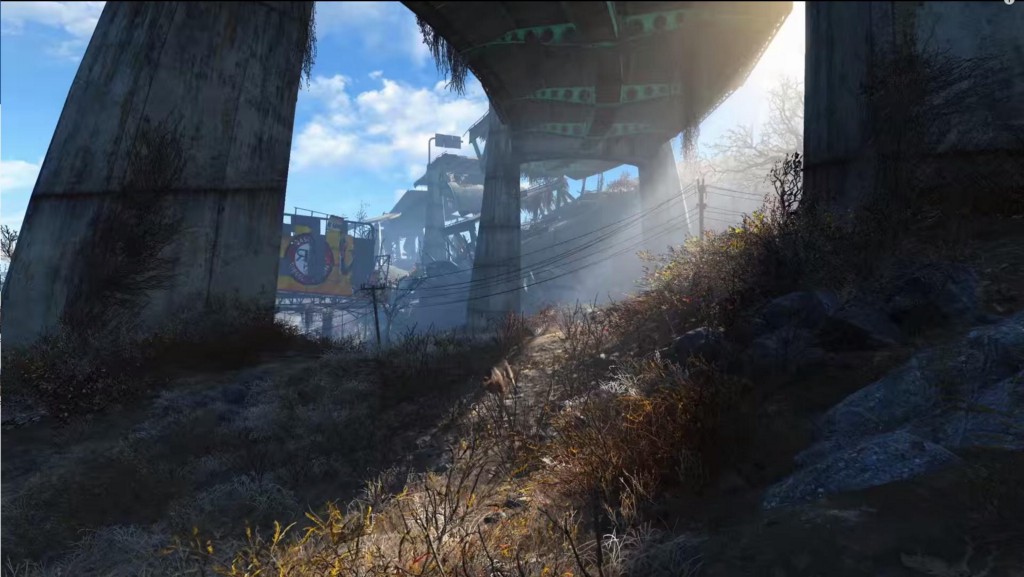
As the Lone Wanderer you encounter potentially hundreds of characters in dozens of storylines that will all interact differently with each other depending on a dizzying array of variables; the game’s writers produced 65,000 unique lines of dialogue to propel the storylines (this holds a Guinness world record), with ways for them all to change depending on which of your choices have affected their outcome. Briefly, the main story arc of the game is that as society has broken down after a nuclear Holocaust 200 years in the future, there are warring factions seeking dominion over the few remaining strongholds of resources that were left relatively intact: the Hoover Dam powering Las Vegas is the centre of the plot; whoever ends up controlling the water supply will govern the Wasteland. The main opposing antagonists are the New California Republic, the last remaining tie to pre-war democracy; the Enclave, the sinister remnants of US high office and the military — descendants of those deemed important enough to rebuild society after the fall; and Caesar’s Legion, a rabid and murderous band of luddite mercenaries pledging to a warped vision of ancient Rome. You can choose to make alliances which play these factions against each other and split their power, or side with whichever you think will bring you the desired outcome — peace, subjugation, anarchy or government rule.
There is a way to play the game without killing a single enemy; you can choose to stealthily avoid all contact, moving slowly enough to remain undetected and seek out only peaceful communities with which to make alliances. You can choose to do only good deeds to enhance your reputation to the point where you accrue so much good karma your character is deemed The Messiah, who eventually negotiates a peaceful resolution to the resource war and brings stability to New Vegas. You can play in completely the opposite manner; bolstering your strength and weaponry while murdering everyone you come across, raiding their supplies, detonating a nuclear warhead on a highly valued trading town under the auspices of a powerful assassin’s emissary. You can become so feared that the moment you step into unknown territory a whole town will descend to try and kill you, or run from your wake. You can choose to sustain yourself with cannibalism or augment your body until you are a cyborg. You can run around in only your underwear or build a suit of mechanical armour. In the post-Apocalypse, anything goes.
You can spend your whole time doing none of these things and rather explore the far reaches of the game world, discovering pre-war books in razed home and libraries, trying to piece together the sequence of events which lead up to the end of history, while scouring abandoned houses littered with ruined children’s toys. Religious sects might send you on pilgrimages to recover their sacred artefacts in exchange for information. You can choose to live a life of hedonism, finding casinos, underground bars, sex clubs and a plethora of drugs to numb the void. There are also in pockets of the world small outposts of people who have managed to enact a modicum of normalcy and community where they happily share resources and shelter and protection of each other. You can choose to ignore the larger conflict of the story altogether and spend all your time on supply runs back and forth to your new home without being seen, playing cards while roasting a dead rat for your dinner in your post-world idyll. Ultimately whatever you do, nothing matters; any mistakes are easily fixed with a do-over where you return to the last save point before you made an error, a bad way to get used to thinking about consequences.
I love these games. I have over the years played them in their various guises over hundreds of hours. New Vegas in particular cast a vice-like spell over me, with its dark humour and pathos and innumerable allusions to famous science fiction, ranging from the obvious (your character can wear armour named after The Road Warrior, giving you the appearance of Mad Max) to the more obscure (the entire pretext of remaking the world through salvaging pre-war technologies which once again become dangerous is taken from A Canticle for Leibowitz). I had spent so much time over so many months exploring the Strip and the Hoover Dam and the surrounding canyons and towns that when I one day visited the real Nevada it felt uncannily familiar to me, so precisely modelled on the real-world locations were the rendered locations of the game. This verisimilitude was probably not unaided by the fact that the real Las Vegas is in a place so aridly harsh and is an entity in itself so unlikely that being there feels like being somewhere teetering on the very edge of sustainability.
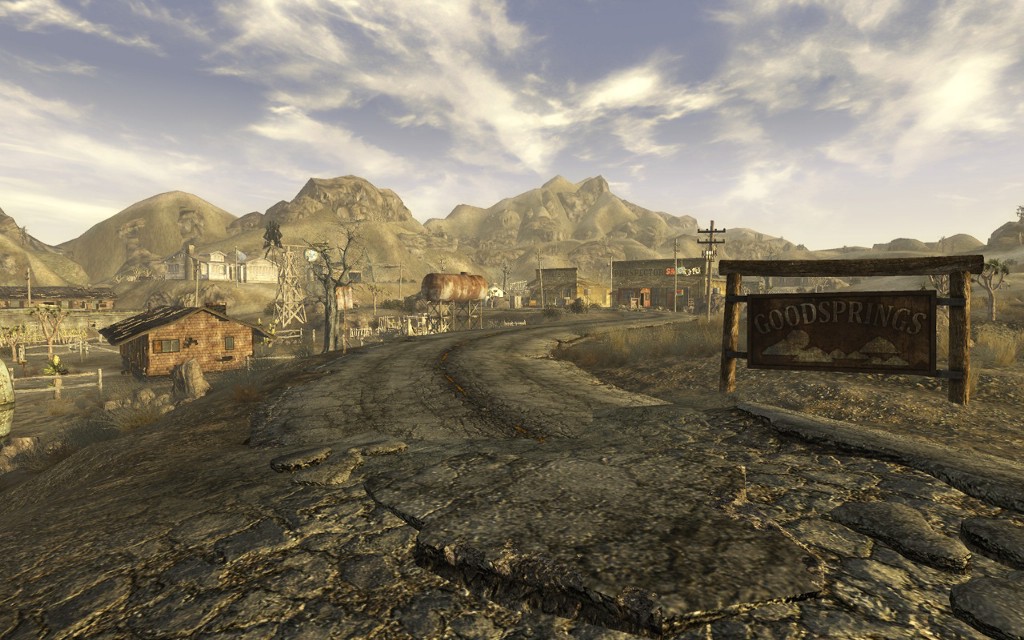
In its clever homages to the history of the genre, New Vegas works as a kind of post-apocalyptic ur-text wherein all possible visions of a post-social future are possible and contemporaneous, waiting to be discovered. You can become so used to the ways of thinking which allow you to strategically progress through the game that spending time in the post-apocalypse becomes not frightening, but deeply, viscerally pleasant.
And therein lies the problem: not in the frittering away of leisure hours enmeshed in a richly realised fantasy world, but in getting comfortable with the idea that if the real world did end, and we had ended it, it might not actually be that bad.

The contemporary rise in popularity of the apocalypse genre ties in neatly with a growing awareness of the real threat posed to the planet by unaddressed global warming. All of these stories are at their core about scarcity and what will happen if new ways are not found to protect, produce and defend new resources (hint: it’s death). These are our anxieties of overconsumption and overpopulation and their resulting emissions and depletions writ large. Similar sci-fi narratives spiked in abundance previously in the 1970’s with the emergence of the realities of peak oil and are being revisited now along similar environmental lines.
Recent critical readings posit Game of Thrones as a nakedly explicit metaphor for climate change; the winter that is coming to annihilate George R.R. Martin’s Westeros is an all-conquering, unstoppable and malevolent force which turns anything it touches into undead and lethal ice zombies which then carry out further unimpeded destruction, bolstering their number by reanimating the dead.
So far in the story all resistance against them is futile, the White Walkers (“Others” in the books) terrifyingly efficient at destroying and co-opting any opposing armies. They work in the mold of the Lovecraftian Outer Gods whose pure destruction and hatred for humanity has no larger goal or meaning beyond being unstoppable and uncannily unknowable to us (this is also the function of sentient killer machines in fiction; existing for no reason other than to obey their programming to exterminate all people). Meanwhile as this threat to the existence of the world of Game of Thrones steadily advances, its variously infighting and warring factions fiddle while Rome burns, unable to get beyond murderous politicking to even acknowledge the White Walkers as real; they are widely regarded as creatures of myth throughout the seven kingdoms, despite the evidence that readers/viewers and the characters who have so far encountered them have to the contrary. The winter constantly threatened to be coming is not a time of exceptional economic and social upheaval in the fight over the king’s throne, but the prophesized and total end of Westeros unless everything changes very quickly.
Vast amounts of narrative thrust are dedicated to characters who have seen the White Walkers’ destruction first hand trying to convince denialists that they are in fact real and drawing nearer while gathering further supernatural strengths. Mounting a meaningful challenge to fend them off — requiring an unprecedented unity and systemic change of governance of this world — is not something that has so far been approached with any kind of true urgency. Instead a major plot line follows the fortunes of the dominant house Lannister whose economic mismanagement is sending the realm broke; a far more pressing and immediate problem that the citizenry wishes to see addressed.
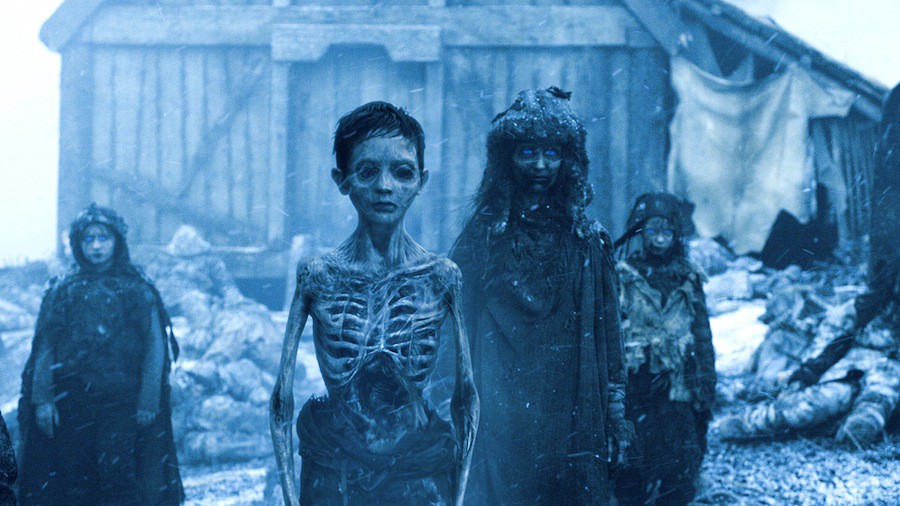
These fictional visions of End Times — zombies, an irradiated techno-dystopia, encroaching frozen wastes — are all spaces in which to achieve catharsis by safely exploring the anxieties of a post-social world without having to meaningfully engage with any of our current behaviours which are contributing to bringing it about in the real world — our rapidly dwindling resources and rising seas. Instead we are placated.
Just as thrill rides are a nonthreatening way for us to confront our mortality in doses small enough for us to cope with, extreme dystopian narratives work as a release valve for our pent-up fears about the future world we are leaving our descendants (Look at these Walking Dead people, it’s not so bad, they found some pudding). These kinds of fictions are no doubt vastly less appealing to anyone who has ever had to actually live through a real natural or ecological disaster, military incursion, displacement or act of terrorism. They are thrilling only if your life has never been threatened in actuality. When that isn’t the case, they provide a pleasurable venting of anxieties in a pretend confrontation with our own demise.
The unsubtle hint of The Walking Dead is that it’s not the ceaseless hordes of infected who are the dead men and women walking, but the few people left alive, each barely clinging on before inevitably succumbing to being consumed (from the show’s perspective, in preferably the most inventively gruesome way possible. If only that much thought went into the plot!), almost never before the last remnants of their humanity have been wretched away from them in brutalizing and nihilistically extreme situations designed to elicit maximum despair.
As a result, the overwhelming feeling that comes from watching The Walking Dead, more intensely than any other vision of global collapse, is one of exhaustion and stasis at seeing nothing more than staving off the inevitable. Our real world inability to drastically curb our consumptions mirrors the character’s loop in which they are stuck, perpetually moving in the same pattern, repeating the same behaviours, trying to escape the same threats by employing the same measures, their numbers thinning all the way. Nothing is changing and yet we keep watching, hoping that magically, someday, something will, just as long as we don’t have to do anything about it.
